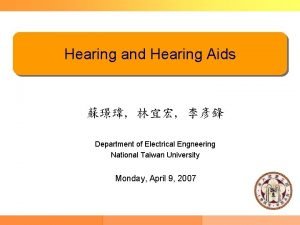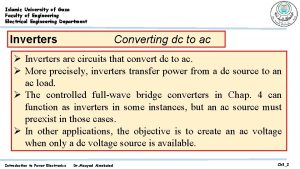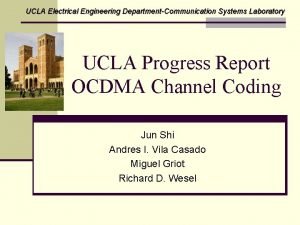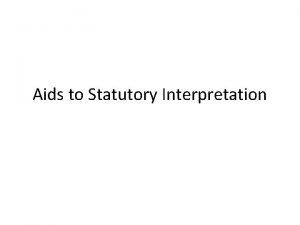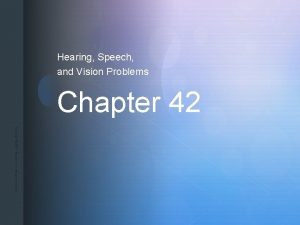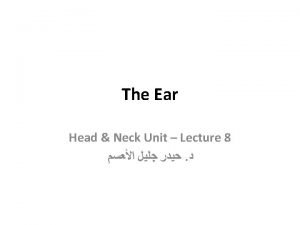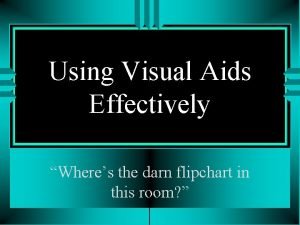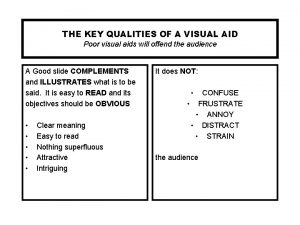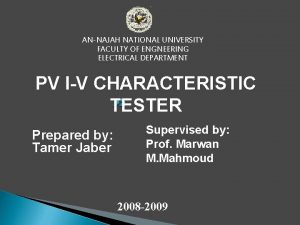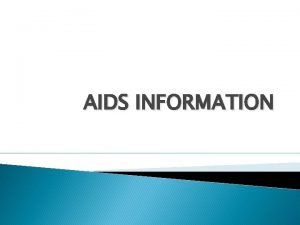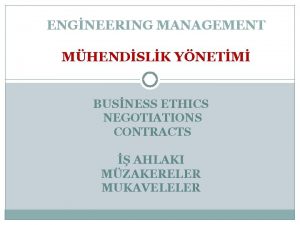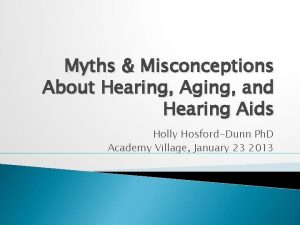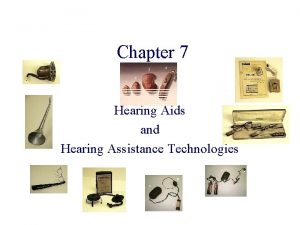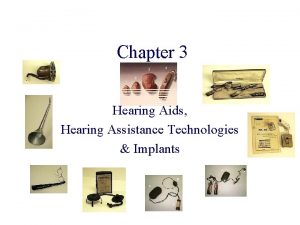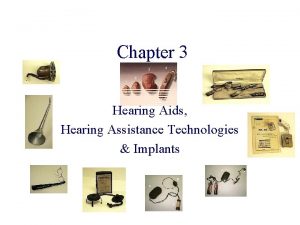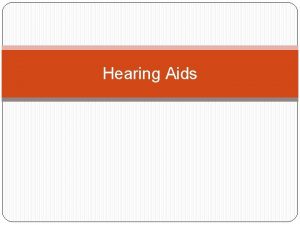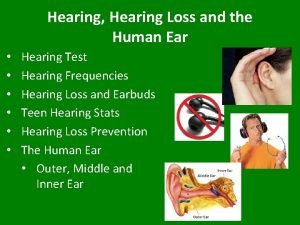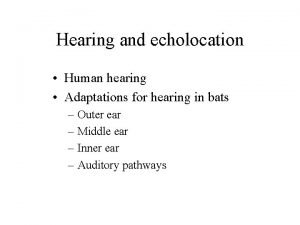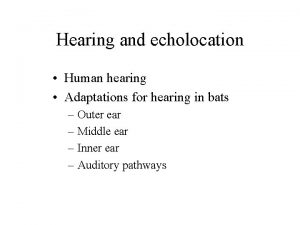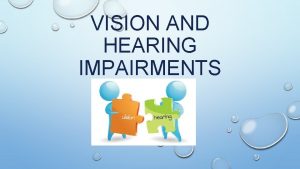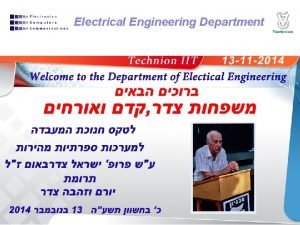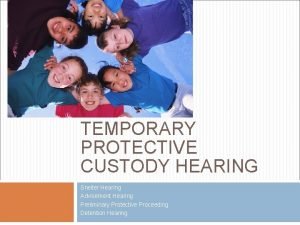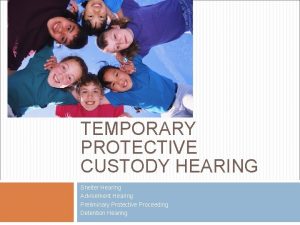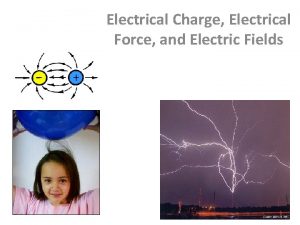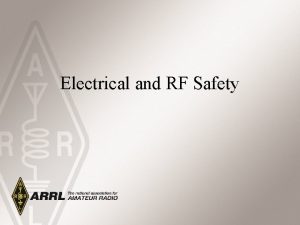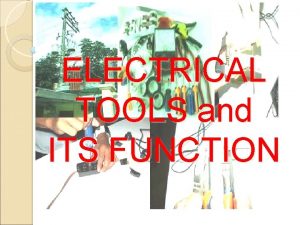Hearing and Hearing Aids Department of Electrical Engneering



























- Slides: 27

Hearing and Hearing Aids 蘇璟瑋, 林宜宏, 李彥鋒 Department of Electrical Engneering National Taiwan University Monday, April 9, 2007

Outline • • • The Structure and Function of Ear Hearing Loss Hearing Aids Summary Reference 2 Su, Lin and Lee Outline Dept. of Electrical Engeering, NTU

The Structure and Function of Ear • The ear of human can be classified into three parts : external ear, middle ear and inner ear. Outer ear Su, Lin and Lee Middle ear Inner ear The Structure of Ear 3 Dept. of Electrical Engeering, NTU

The Structure and Function of Ear (Cont’d) • External Ear : Preamplifier Ø Pinna Collects sound waves and amplifies sound Ø Ear Canal : Amplifies frequencies in the range 3 k. Hz to 12 k. Hz 4 Su, Lin and Lee External Ear Dept. of Electrical Engeering, NTU

The Structure and Function of Ear (Cont’d) • External Ear : Preamplifier Ø Pinna Collects sound waves and amplifies sound Ø Ear Canal : Amplifies frequencies in the range 3 k. Hz to 12 k. Hz Total gain Gain from Pinna Gain from Ear Canal Frequency (k. Hz) The frequency response of external ear Su, Lin and Lee External Ear 5 Dept. of Electrical Engeering, NTU

The Structure and Function of Ear (Cont’d) • Middle Ear Ø Conduction Conduct sound from the outer ear to the inner ear Ø Protection Middle ear muscles provide protection from loud sounds Barrier between external ear and inner ear 6 Su, Lin and Lee Middle Ear Dept. of Electrical Engeering, NTU

The Structure and Function of Ear (Cont’d) • Middle Ear Ø Transducer Converts acoustic energy to mechanical energy Converts mechanical energy to hydraulic energy Ø Amplifier The frequency response of Middle Ear Su, Lin and Lee Middle Ear 7 Dept. of Electrical Engeering, NTU

The Structure and Function of Ear (Cont’d) • Inner Ear Ø Hearing ü Frequency Selectivity Ø Balance 8 Su, Lin and Lee Inner Ear Dept. of Electrical Engeering, NTU

Hearing Loss • The type of hearing loss Ø Conductive hearing loss Sound cannot be conducted efficiently through the outer ear canal to the eardrum and the tiny bones, or ossicles, of the middle ear. Ø Sensorineural hearing loss There is damage to the inner ear (cochlea) or to the nerve pathways from the inner ear (retrocochlear) to the brain. Sensorineural hearing loss cannot be medically or surgically corrected. Ø Mixed hearing loss Su, Lin and Lee 9 Hearing Loss Dept. of Electrical Engeering, NTU

Hearing Loss (Cont’d) (1) Decreased Audibility Ø Conductive hearing loss Ø Sensorineural hearing loss 10 Su, Lin and Lee Decreased Audility Dept. of Electrical Engeering, NTU

Hearing Loss (Cont’d) (2) Decreased Dynamic Range Ø Normally, the dynamic range of hearing equals 120 d. Bs roughly. 11 Su, Lin and Lee Decreased Dynamic Range Dept. of Electrical Engeering, NTU

Hearing Loss (Cont’d) (3) Decreased Frequency Resolution Ø SNR Loss Ø Sensitivity Loss Ø Clarity Loss (3) Decreased Temporal resolution 12 Su, Lin and Lee Decreased Frequency Resolution Dept. of Electrical Engeering, NTU

Hearing Aids • Basic Structure and Design of Modern Hearing Aids 13 Su, Lin and Lee Dept. of Electrical Engeering, NTU

Hearing Aids (Cont’d) • The Function of Hearing Aids Ø Compression 14 Su, Lin and Lee Dept. of Electrical Engeering, NTU

Hearing Aids (Cont’d) • The Function of Hearing Aids (Cont’d) Ø Directional Microphone and Microphone array This method enables the design of highly-directive-hearing instruments which are comfortable, inconspicuous, and convenient to use. The array provides the user with a dramatic improvement in speech perception over existing hearing aid designs, particularly in the presence of background noise, reverberation, and feedback. 15 Su, Lin and Lee Dept. of Electrical Engeering, NTU

Hearing Aids (Cont’d) • The Function of Hearing Aids (Cont’d) Ø Directional Microphone and Microphone Array (Cont’d) 16 Su, Lin and Lee Dept. of Electrical Engeering, NTU

Hearing Aids (Cont’d) • The Function of Hearing Aids (Cont’d) Ø Noise Reduction ü Method 1 Using high pass filter, but the eliminates both speech and noise in the frequency region between 0. 4 k. Hz and 1. 0 k. Hz. 17 Su, Lin and Lee Dept. of Electrical Engeering, NTU

Hearing Aids (Cont’d) • The Function of Hearing Aids (Cont’d) Ø Noise Reduction (Cont’d) ü Method 2 Adaptive noise cancellation, need at leat two microphones 18 Su, Lin and Lee Dept. of Electrical Engeering, NTU

Hearing Aids (Cont’d) • The Function of Hearing Aids (Cont’d) Ø Speech Enhancement 19 Su, Lin and Lee Dept. of Electrical Engeering, NTU

Hearing Aids (Cont’d) • The Function of Hearing Aids (Cont’d) Ø feedback cancellation Acoustic feedback in hearing aids, which, if severe enough, causes the aid to emit a high-intensity oscillation (known as ‘whistling, ’ ‘screeching, ’ or ‘howling’) is a persistent and annoying problem. Block diagram of amplification and feedback in a hearing aid. Continuous adaptation feedback cancellation scheme 20 Su, Lin and Lee Dept. of Electrical Engeering, NTU

Hearing Aids (Cont’d) • The Function of Hearing Aids (Cont’d) Ø feedback cancellation (Cont’d) An adaptive algrithom attempts to identify the hearing-aid feedback path. Once the feedback path has been identified, an estimate of its output is subtracted from the microphone signal. Thus the hearing-aid user hear the amplified input signal with a reduction of the distortion caused by the feedback path. Continuous adaptation feedback cancellation scheme Su, Lin and Lee 21 Dept. of Electrical Engeering, NTU

Hearing Aids (Cont’d) • The types of Hearing Aid Ø 線性電路助聽器 Ø 壓縮類比式電路助聽器 Ø 電腦程控式助聽器 Ø Advantage ü 價格低 ü 調整快速 Ø Disadvantage ü 調整彈性低 22 Su, Lin and Lee Dept. of Electrical Engeering, NTU

Hearing Aids (Cont’d) • The types of Hearing Aid (Cont’d) Ø 數位助聽器 Ø Advantage ü 價格較高 ü Performance(清晰度、音質、SNR等)高 Ø Disadvantage ü 調整彈性不易 Su, Lin and Lee 23 Dept. of Electrical Engeering, NTU

Summary Although many techniques are provided to solve the problem of hearing loss, but those methods are still poor for practical application. Ø Hearing aid makes sound too loud Ø Poor performance in background noise Ø Hear things, but not clear Ø Acoustic feedback Ø Cost 24 Su, Lin and Lee Dept. of Electrical Engeering, NTU

Summary (Cont’d) Hearing-aid design involves in many region Ø Electronics (circuit, system, analog/digital signal processing etc. ) Ø Medicine Ø Even though Art designer 25 Su, Lin and Lee Dept. of Electrical Engeering, NTU

Reference • Sound, http: //www. britannica. com/ebc/article-64016 • Reliability of computer-automated hearing thresholds in cochlearimpaired listeners using ER-4 B Canal Phone Earphones, James A. Henry, Ph. D et al. , http: //www. rehab. research. va. gov/jour/03/40/3/henry. htm • 富聆聽力中心, http: //www. new-care. com. tw • Suband Adaptive Filtering Applied to Acoustic Feedback Reduction in Hearing Aids, M. G. Siqueira et al. , http: //citeseer. ist. psu. edu/siqueira 96 subband. html • B. Widrow, “A microphone array for hearing aids, ” IEEE Circuits Syst. Mag. , vol. 1, pp. 26 -32, 2001. • 人耳聽覺與聽力損失, http: //www. iosh. gov. tw/netbook/noear 2. htm 26 Su, Lin and Lee Dept. of Electrical Engeering, NTU

Thank you for your attention. 27 Su, Lin and Lee Dept. of Electrical Engeering, NTU
 Electrical engneering
Electrical engneering Hearing aids picture
Hearing aids picture Hearing aids ennis
Hearing aids ennis Tum department of electrical and computer engineering
Tum department of electrical and computer engineering Electrical engineering department
Electrical engineering department Ucla ee department
Ucla ee department Last stages of aids-pictures
Last stages of aids-pictures A bacterial std that usually affects mucous membranes
A bacterial std that usually affects mucous membranes Chapter 24 sexually transmitted diseases and hiv/aids
Chapter 24 sexually transmitted diseases and hiv/aids Extrinsic and intrinsic aids to statutory interpretation
Extrinsic and intrinsic aids to statutory interpretation Non projected visuals
Non projected visuals Supplementary aids and services example
Supplementary aids and services example Chapter 42 hearing speech and vision problems
Chapter 42 hearing speech and vision problems The receptors for hearing are the
The receptors for hearing are the Bony labrynth
Bony labrynth Beach side sight
Beach side sight Family
Family Proxemics in communication skills
Proxemics in communication skills Bsc speech
Bsc speech Aids arms inc
Aids arms inc Define audio visual aids
Define audio visual aids Disadvantages of flip chart
Disadvantages of flip chart Meaning of teaching aids
Meaning of teaching aids Potty training visuals
Potty training visuals Poor visual aids
Poor visual aids Aids alliance raleigh nc
Aids alliance raleigh nc Aidsfobia
Aidsfobia Science staar supplemental aids
Science staar supplemental aids
